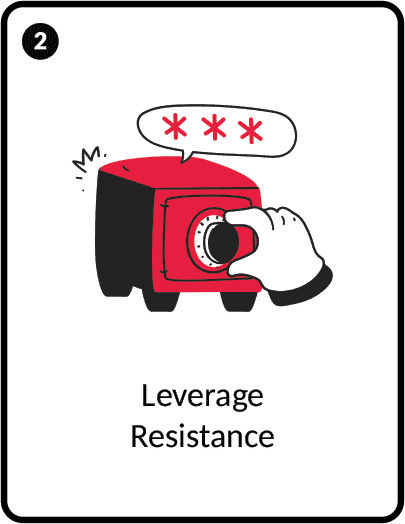
The problem
It can sometimes be hard to start a habit, and nobody is protected from giving up. At the other way, yielding for tempting toxic habits is really easy.
Goal
Leverage the power of resistance.
Potential
Willpower is limited, the more you spend it on trying to motivate yourself, the less willpower energy remain for your goal. Resistance will take care of your willpower.
4 powerful steps to leverage resistance
Definitions
Resistance is the ability to prevent something from having an effect.
1. Where and how to take care about resistance?
To add resistance on an action: either increase the number of necessary steps, either increase their painfulness.
On repetitive actions
Daily tasks require daily motivation. More energy means more resource to succeed so less chance to fail. By reducing the amount of motivation required to start working, you save energy for the task itself. The key is therefore to spot any repetitive action in your daily life and try to simplify the steps and the efforts needed to start them.
Let’s say you want to go to the gym 3 times per week, each time you need to: dress accordingly, prepare your bag; including filling your bottle and taking your accessories, you then need to walk or drive to the gym, so on and so on. Thinking about all those steps may implicitly discourage you because each step increases the likelihood that you give up and end up binging Netflix.
In that case, how can you reduce resistance? Preparing your bag, the day before, gathering your clothes with it and if you can, choosing the closest gym possible.
On toxic temptations
It requires energy to resist a temptation. This energy, willpower, is limited. While you are spending time resisting the temptation, you are depleting your motivation. A more efficient strategy is to let resistance resist for you. This time, we want to increase the number of steps and effort required to access a temptation. That way, we will be lazier to access it. For example, if you want to spend less time playing video games, you can uninstall each game after playing it so the next time you want to play, the effort needed to reinstall the game (including waiting) may discourage you. If it’s not enough, you can also put a long password, write it on a paper, keep this paper on your car or further from you. Now to play you’ll have to go in a long series of steps, giving you enough resistance to at least reduce your video game consumption.
Learn here how to deal with the most tempting toxic temptations.
2. Resistance for phone & computer
Here are some strategies you can implement to reduce your digital toxic habits:
◦ Turn off your phone / Pull away the cables & battery
◦ Add opening delay
◦ Log out
◦ Uninstall the app after using it.
◦ Login out from the store so reinstalling it takes more time. (Be careful to know your password).
◦ Create a password you can’t remember, write it on a piece of paper for example, and put it in a room different than were you spend your time. That way, you’ll have to physically move in order to get it.
◦ Give your code to a family member or close friend to whom you’ll have to ask for before yielding. Of course, they need to be aware of what you are trying to achieve, so they don’t give it to you instantly but check you are actually really in need.
◦ After using them, estrange them. The further they are, the more resistance.
3. Powerful strategies to decrease resistance
Proximity
Some tasks are boring and not rewarding.
Because of this reason, you want to decrease resistance as much as possible. Any task that needs to be completed should be able to be started in less than 20 seconds. In this workspace, all tools are accessible in a few seconds. It means that your setup allows you to access the tasks in less than 20 seconds. If it’s more, your brain will consider it as a heavy step in the process and will generate resistance… If you are working on a computer, be sure that it will take less than a few seconds to turn on and open what you need.
Ease
The motivation you need to start a task also depends on the heaviness of each step. For example, it will be easier to buy a car than buying a house, simply because the charge of the decision process is way heavier. How can you make your daily task lighter? For example if you are trying to learn a language, taking a teacher that prepare you the materials, schedule the session and motivates you can be powerful help: by reducing the heaviness of the task, you just have to show up, you maximize your likelihood of making progress.